National Hereditary Cancer Week 2024, was observed from September 29 to October 5, 2024.
Hereditary Cancer Week is recognized primarily in the U.S. and the U.K. during the first week of October.
It serves as a critical reminder of the profound effects hereditary cancer has on families and communities. This week provides a platform to raise awareness about the importance of genetic factors in cancer risk, emphasizing the need for education and support for those affected. By highlighting the experiences of individuals with hereditary cancer syndromes—such as Lynch syndrome and mutations in genes like BRCA1, BRCA2, and others—this observance encourages open conversations and fosters understanding about the challenges faced by those with a personal or familial history of cancer.
October 2 marks National Previvor Day, a special day dedicated to acknowledging the resilience of those who carry genetic mutations that increase their cancer risk but have not yet developed the disease. This week is a time to honor not only survivors and previvors but also caregivers and family members who play vital roles in their journeys. By sharing information and resources, National Hereditary Cancer Week aims to empower individuals to take proactive steps in their health management, ultimately saving lives through increased awareness and early intervention.
Healthcare professionals, organizations and survivors shared their insights on social media.
“This week is National Hereditary Cancer Week. About 1 in 10 cancers are hereditary, meaning they are caused by an inherited genetic mutation, and there are several types of mutations that can cause several different types of cancer. The most common mutations that cause an increased risk for breast cancer specifically are the BRCA1 and BRCA2 mutations. Anyone living with an increased risk for cancer due to family history or genetics is considered a “Previvor.” Yesterday, October 2 was National Previvor Day.
Previvors are faced with numerous doctor’s appointments, scans, screenings, and difficult medical decisions about their life and body, usually at a young age while also working and going to school. Too often, previvors walk a lonely road where their increased cancer risk is not taken seriously by their doctors, family and friends, or the cancer community.
Due to an extensive family history of breast cancer, I was tested for and confirmed BRCA1+ in early 2023, several months prior to being diagnosed with TNBC. Having a BRCA1 gene mutation means a lifetime risk for developing breast cancer of up to 72% (check!) and a lifetime risk for developing ovarian cancer of up to 58%, along with increased risks for several other types of cancer, including pancreatic cancer and melanoma, that are currently less understood and being studied. This is also known as Hereditary Breast and Ovarian Cancer Syndrome (HBOC).
Getting tested for and confirming my BRCA1+ status is one of the first of many small decisions that saved my life. If I had been unaware of my significantly increased cancer risk, I would have had no reason to be concerned in my early 30’s. After all, I was busy getting a degree, starting my career, and buying a home – all of the “normal” things a person in their 30’s should be worrying about.
It’s estimated that more than 80% of people with an identifiable genetic risk for cancer don’t know about it. If you have a family history of any type of cancer, talk to your doctor about the possibilities of genetic testing. FORCE: Facing Our Risk of Cancer Empowered is a great resource for information on genetic mutations, types of cancer, risk management, navigating the insurance system, and public policy. The Breasties is an all-inclusive non-profit for survivors, previvors, thrivers, and caregivers impacted by breast and gynecologic cancers. Check both of these organizations out, especially if you or someone you know is facing an increased risk of cancer or a diagnosis. And if you have any questions or just don’t know where to start, please feel free to reach out to me directly!
Photo: Me living life as a Previvor in early December 2023, just a few days before the mammogram that would lead to my breast cancer diagnosis.”
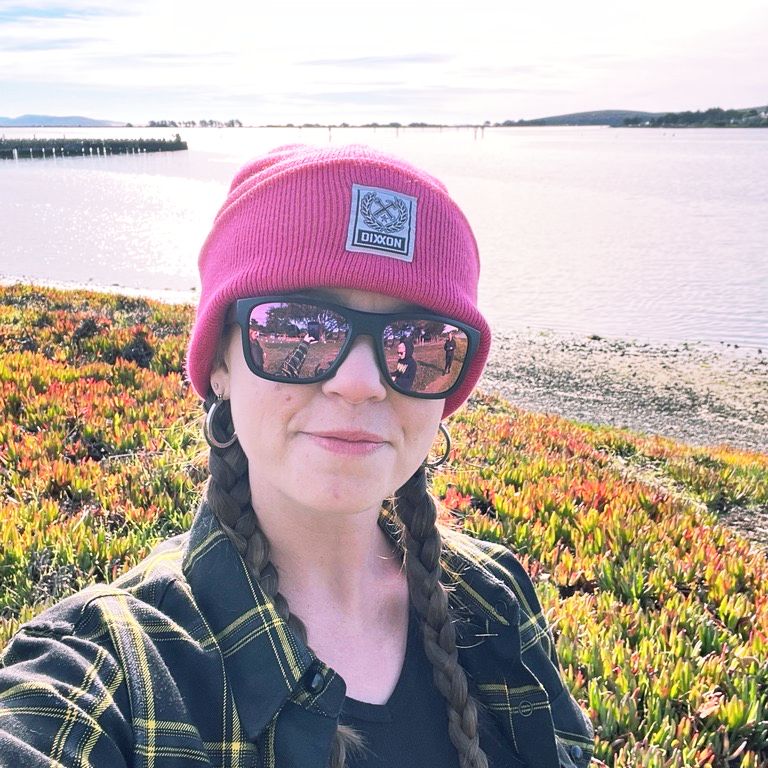
“The MOMA team was honored to welcome Susan Feinberg, who is living with a Hereditary Cancer, to our summer retreat. Susan, pictured with a photo of her grandmother and cousin who both passed away from breast cancer as a result of their shared BRCA1 mutation, shared her diagnosis and treatment journey with us, helping to illuminate the real-life impact hereditary cancer can have across various cancer types and mutations. Coordinated with FORCE: Facing Our Risk of Cancer Empowered, this opportunity to hear from Susan brought us renewed perspective on our collective mission and promise of our work.
This National Hereditary Cancer Week, we reflect on the 1 FORCE community of people – hereditary cancer survivors, previvors, caregivers and family members, and continue our work with heightened inspiration and motivation to keep pushing for the next generation of genetic medicines.
For more information on Hereditary Cancer and FORCE, visit here.”
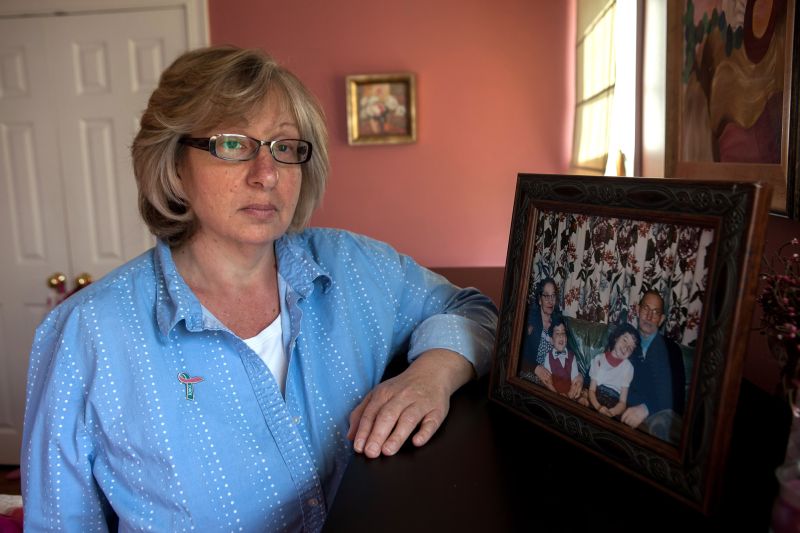
“This week is National Hereditary Cancer Week and today is National Previvor Day. I’m an ovarian cancer previvor, meaning I have an elevated risk for developing ovarian cancer but have taken steps to significantly reduce my risk.
Hereditary cancer can take many forms including breast, ovarian, pancreatic, colorectal, prostate, and melanoma. If you have a family history of one type of cancer in more than one family member or multiple types of cancer, speak with a genetic counselor to assess your risk.
Thanks to Mark A Hicks for the wonderful illustration below and explanation of what a previvor is.”
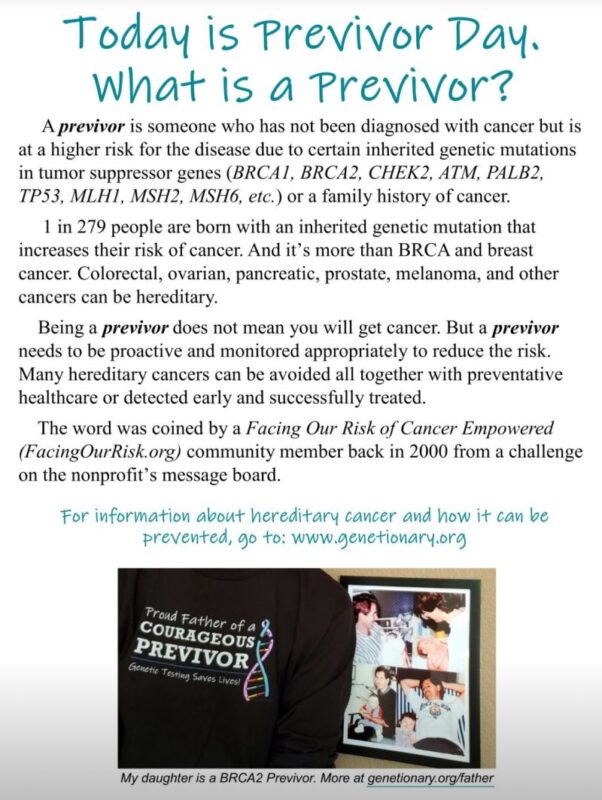
National Cancer Institute (NCI):
“It’s National Hereditary Cancer Week. Did you know that the FDA recently authorized a blood test that detects inherited genetic changes that may increase the risk of developing certain cancers?
The test, the Invitae Common Hereditary Cancers Panel, analyzes a person’s blood sample for changes in 47 genes that are linked to hereditary forms of cancer. Up to 10% of cancers are thought to be caused by genetic changes that are passed from parent to child. Inheriting one of these changes does not mean that a person will develop cancer, but it increases the likelihood of the disease occurring. Learn more.”

NHS South East Genomic Medicine Service:
“This week is Hereditary Cancer Awareness Week in the UK and we are looking for people who have been screened for Lynch Syndrome. Your experience can help improve our services for the future!”
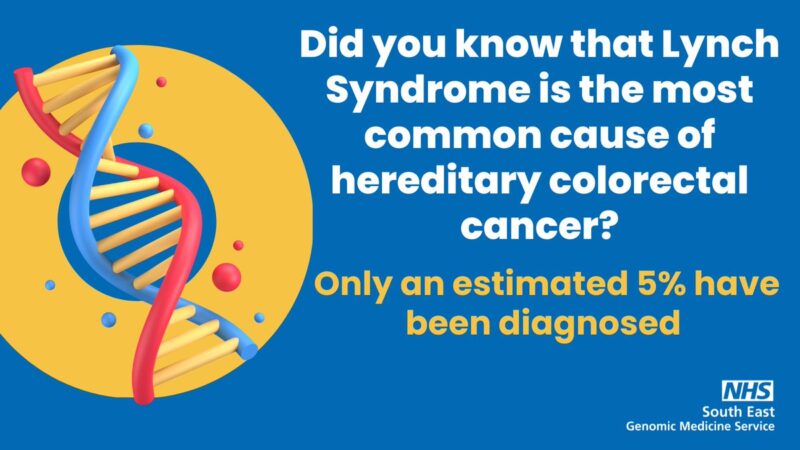
“No better way to raise awareness during Hereditary Cancer Week than to host Patrick Lynch from MD Anderson Cancer Centre for the Ahnen Lectureship. Some unexpected lessons:
- Don’t take yourself too seriously
- Always travel with sauce in your bag
- Keep your mind and body.”
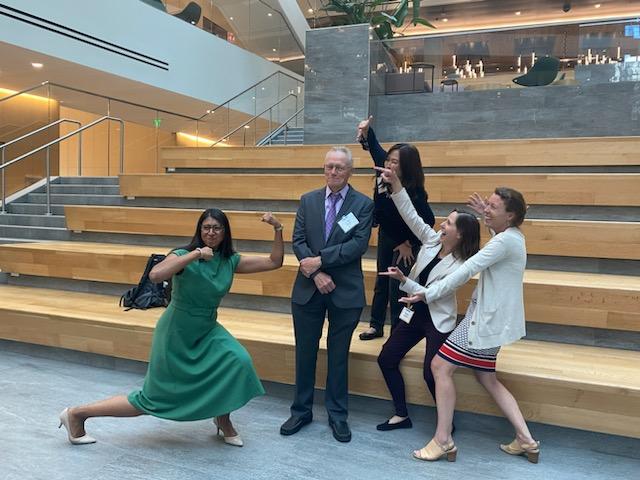
Fred Hutchinson Cancer Center:
“Testing for inherited cancer risk has become more accessible, affordable and accurate. Fred Hutch clinicians and researchers explain why it can be important, how to do it and where the field is headed.”
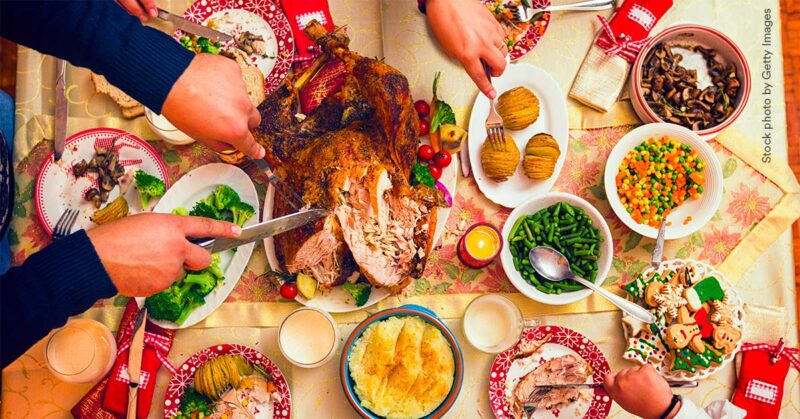
“Many patients do not learn about their inherited gene mutations until after they are diagnosed with cancer. We echo the 2022 Panel recommendation to expand access to genetic testing and counseling for cancer risk assessment. Learn more.”
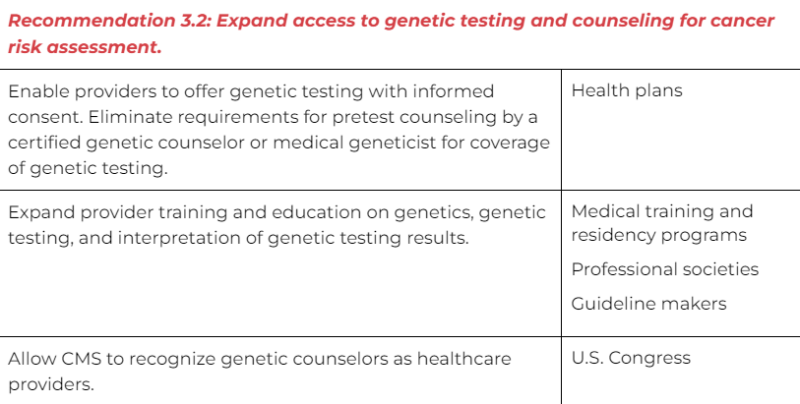
For more posts like this, visit oncodaily.com


